A Story about a Russian DRM and Lego Rock Raiders
This weekend I’ve been approached by The Research Realm, a group of people who aim to preserve Lego’s history, to create a No-CD crack and fix a bug in the game that prevented any player from progressing in the Russian version of the game Lego Rock Raiders. In this blog post, I’ll take you through the entire process of doing this, step by step, including all the mistakes I’ve made along the way in a story-telling fashion.
I’ve never been a Lego Rock Raiders player myself (I’ve been a Lego Island kid instead!) so I don’t know the exact intricacies and mechanics of the game. My main motivation derived from:
- Me believing that preservation is very important
- My girlfriend having fond memories of the game from back in her childhood
Update: I made a website that allows you to automagically patch a protected file directly in your browser. The tool can also be run on the CLI. The source code is available here.
Background
Based on the information I was provided, I thought 2 separate issues took place in the game:
- A CD check prevents the game from being played without a mounted ISO/CD
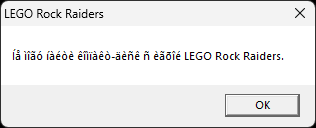
- A bug would prevent the player from progressing the game as it was not possible to upgrade the “base” in-game
Notice how in the video the rock count doesn’t decrease - normally, upon upgrading the base, it should play an animation as well as subtract the appropriate amount of rocks. Without this feature, it’s not possible to progress in the game. At the time, I thought this was likely some obscure bug, perhaps a “normal” bug within the game itself; however, the bug would never cause any issues due to some inconsistency between older versions of Windows and modern ones (as seen in multiple older titles).
The CD Check
Opening up the LegoRR.exe binary in your favorite decompiler and going to the WinMain function will reveal what’s going on fairly quickly (… or does it?):
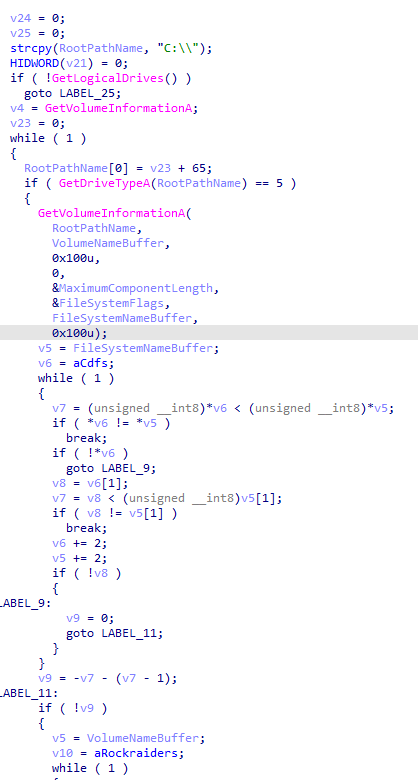
That looks fairly straightforward, doesn’t it? Let’s summarize:
- Loop through some drive letters
- For each drive letter, call
GetDriveTypeAand check whether it returnsDRIVE_CDROM(5) - If it does, call
GetVolumeInformationAand compareVolumeNameBufferandFileSystemNameBufferto known values
The known values are:
VolumeNameBuffer=ROCKRAIDERSFileSystemNameBuffer=CDFS
The rest of WinMain calls some more functions, but I wasn’t interested in that yet - all I wanted was to bypass the message box (the call to MessageBoxA in the following screenshot) and progress into the game.
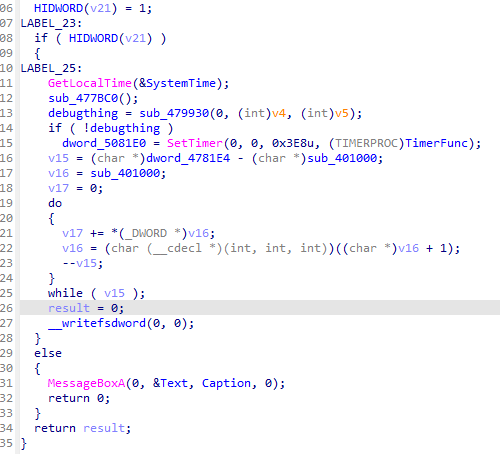
During debugging, I noticed that I wasn’t able to set normal breakpoints as the game would eventually break the stack and execute a bogus address. I thought that it was likely due to some sort of integrity check (bonus points if you were already able to spot it in the screenshot) but I didn’t bother with it since I could just use hardware breakpoints. For some context: Software breakpoints overwrite a byte at the target location and set it to 0xCC, which is the equivalent of int3 to cause an exception.
However, knowing that I can’t patch the code itself, I had to think of a “strategy” on how to implement these patches without making any changes to the .text section of LegoRR.exe.
Bypassing the CD Check
You probably already knew the solution: Hooking the API calls! This will change the code within kernel32.dll, but since the game doesn’t verify the integrity of that DLL, we can just modify it as we please. Now we just need a target DLL to replace on disk. Chances are, if you’ve already reversed older games, you’ve already seen the DLL d3drm.dll. It’s a perfect candidate for our scenario. Next step is creating a new C/C++ project along with my favorite hooking library MinHook.
Since we’re proxying d3drm.dll, we have to rename the original DLL to something else, and then rename our crack to d3drm.dll. I chose to name the original DLL d3drm_ori.dll. We first tell the linker to forward the exports of the original DLL:
#pragma comment(linker, "/export:D3DRMColorGetAlpha=d3drm_ori.D3DRMColorGetAlpha,@1")
#pragma comment(linker, "/export:D3DRMColorGetBlue=d3drm_ori.D3DRMColorGetBlue,@2")
#pragma comment(linker, "/export:D3DRMColorGetGreen=d3drm_ori.D3DRMColorGetGreen,@3")
#pragma comment(linker, "/export:D3DRMColorGetRed=d3drm_ori.D3DRMColorGetRed,@4")
#pragma comment(linker, "/export:D3DRMCreateColorRGB=d3drm_ori.D3DRMCreateColorRGB,@5")
#pragma comment(linker, "/export:D3DRMCreateColorRGBA=d3drm_ori.D3DRMCreateColorRGBA,@6")
#pragma comment(linker, "/export:D3DRMMatrixFromQuaternion=d3drm_ori.D3DRMMatrixFromQuaternion,@7")
#pragma comment(linker, "/export:D3DRMQuaternionFromRotation=d3drm_ori.D3DRMQuaternionFromRotation,@8")
#pragma comment(linker, "/export:D3DRMQuaternionMultiply=d3drm_ori.D3DRMQuaternionMultiply,@9")
#pragma comment(linker, "/export:D3DRMQuaternionSlerp=d3drm_ori.D3DRMQuaternionSlerp,@10")
#pragma comment(linker, "/export:D3DRMVectorAdd=d3drm_ori.D3DRMVectorAdd,@11")
#pragma comment(linker, "/export:D3DRMVectorCrossProduct=d3drm_ori.D3DRMVectorCrossProduct,@12")
#pragma comment(linker, "/export:D3DRMVectorDotProduct=d3drm_ori.D3DRMVectorDotProduct,@13")
#pragma comment(linker, "/export:D3DRMVectorModulus=d3drm_ori.D3DRMVectorModulus,@14")
#pragma comment(linker, "/export:D3DRMVectorNormalize=d3drm_ori.D3DRMVectorNormalize,@15")
#pragma comment(linker, "/export:D3DRMVectorRandom=d3drm_ori.D3DRMVectorRandom,@16")
#pragma comment(linker, "/export:D3DRMVectorReflect=d3drm_ori.D3DRMVectorReflect,@17")
#pragma comment(linker, "/export:D3DRMVectorRotate=d3drm_ori.D3DRMVectorRotate,@18")
#pragma comment(linker, "/export:D3DRMVectorScale=d3drm_ori.D3DRMVectorScale,@19")
#pragma comment(linker, "/export:D3DRMVectorSubtract=d3drm_ori.D3DRMVectorSubtract,@20")
#pragma comment(linker, "/export:Direct3DRMCreate=d3drm_ori.Direct3DRMCreate,@21")
#pragma comment(linker, "/export:DllCanUnloadNow=d3drm_ori.DllCanUnloadNow,@22")
#pragma comment(linker, "/export:DllGetClassObject=d3drm_ori.DllGetClassObject,@23")Now all that’s required is creating the hooks:
decltype(GetVolumeInformationA)* g_OriginalGetVolumeInformationA = nullptr;
decltype(GetDriveTypeA)* g_OriginalGetDriveTypeA = nullptr;
// ...
BOOL WINAPI GetVolumeInformationA_hk(
LPCSTR lpRootPathName,
LPSTR lpVolumeNameBuffer,
DWORD nVolumeNameSize,
LPDWORD lpVolumeSerialNumber,
LPDWORD lpMaximumComponentLength,
LPDWORD lpFileSystemFlags,
LPSTR lpFileSystemNameBuffer,
DWORD nFileSystemNameSize
)
{
BOOL result = g_OriginalGetVolumeInformationA(
lpRootPathName,
lpVolumeNameBuffer,
nVolumeNameSize,
lpVolumeSerialNumber,
lpMaximumComponentLength,
lpFileSystemFlags,
lpFileSystemNameBuffer,
nFileSystemNameSize
);
std::cout << "GetVolumeInformationA(...) -> " << result << std::endl;
std::cout << " lpRootPathName: " << lpRootPathName << std::endl;
if (strcmp(lpRootPathName, "C:\\") == 0)
{
// Spoof the volume name and file system name, the Russian version for some reason only checks this.
if (lpVolumeNameBuffer && nVolumeNameSize > 0)
strncpy_s(lpVolumeNameBuffer, nVolumeNameSize, "ROCKRAIDERS", nVolumeNameSize - 1);
if (lpFileSystemNameBuffer && nFileSystemNameSize > 0)
strncpy_s(lpFileSystemNameBuffer, nFileSystemNameSize, "CDFS", nFileSystemNameSize - 1);
std::cout << " lpVolumeNameBuffer: " << (lpVolumeNameBuffer ? lpVolumeNameBuffer : "NULL") << std::endl;
std::cout << " lpFileSystemNameBuffer: " << (lpFileSystemNameBuffer ? lpFileSystemNameBuffer : "NULL") << std::endl;
std::cout << "Spoofed CD volume information" << std::endl;
}
return result;
}
UINT WINAPI GetDriveTypeA_hk(LPCSTR lpRootPathName)
{
UINT result = g_OriginalGetDriveTypeA(lpRootPathName);
// The game will eventually call this but it can't ever exist, so we'll just use this
if (strcmp(lpRootPathName, "C:\\") == 0)
{
std::cout << "Spoofing as CDROM drive" << std::endl;
result = DRIVE_CDROM;
}
std::cout << "GetDriveTypeA(\"" << lpRootPathName << "\") -> " << result << std::endl;
return result;
}
// ...
if (MH_Initialize() != MH_OK)
std::cout << "Failed to initialize MinHook" << std::endl;
if (MH_CreateHookApi(
L"kernel32.dll",
"GetVolumeInformationA",
GetVolumeInformationA_hk,
reinterpret_cast<LPVOID*>(&g_OriginalGetVolumeInformationA)
) != MH_OK)
std::cout << "Failed to create hook for GetVolumeInformationA" << std::endl;
if (MH_CreateHookApi(
L"kernel32.dll",
"GetDriveTypeA",
GetDriveTypeA_hk,
reinterpret_cast<LPVOID*>(&g_OriginalGetDriveTypeA)
) != MH_OK)
std::cout << "Failed to create hook for GetDriveTypeA" << std::endl;We don’t do anything fancy here, we’re just creating hooks for GetVolumeInformationA and GetDriveTypeA. The hooks then replace the “wrong” information with the expected information:
GetDriveTypeAnow returnsDRIVE_CDROMfor the driveC:\GetVolumeInformationAnow copiesROCKRAIDERSandCDFSto the corresponding buffers
With this in place, and both DLLs (d3drm.dll, our proxy DLL; and d3drm_ori.dll, the original DLL) in the installation folder, we can successfully get to the video mode selection window (and thus also into the game).
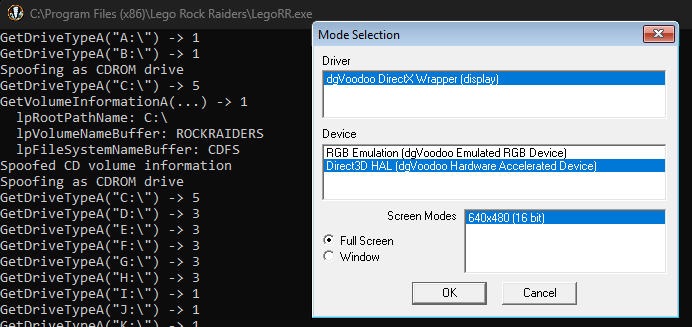
With that, we’ve reached our first milestone - we’re able to bypass the CD check (for now). I was actually going to stop here, but I eventually decided I couldn’t resist and started looking into the upgrade bug as well…
Finding Nemo the Bug
Finding a specific place in code, especially inside of a large game engine, is usually a difficult task; however, I had multiple options here.
Fail #1
My first approach was looking through all known variants (read: languages) of the game and checking the timestamp and filesize of LegoRR.exe. My hypothesis was that if I find a file that’s similar enough, I may be able to just diff them against each other to find any changes that might catch my eye. Turns out the Japanese version is only 1 month “younger” while being 1kb bigger than the Russian version. An archive of all released languages can be found here. I used IDA Pro 9.1 and Diaphora to create the diffs:
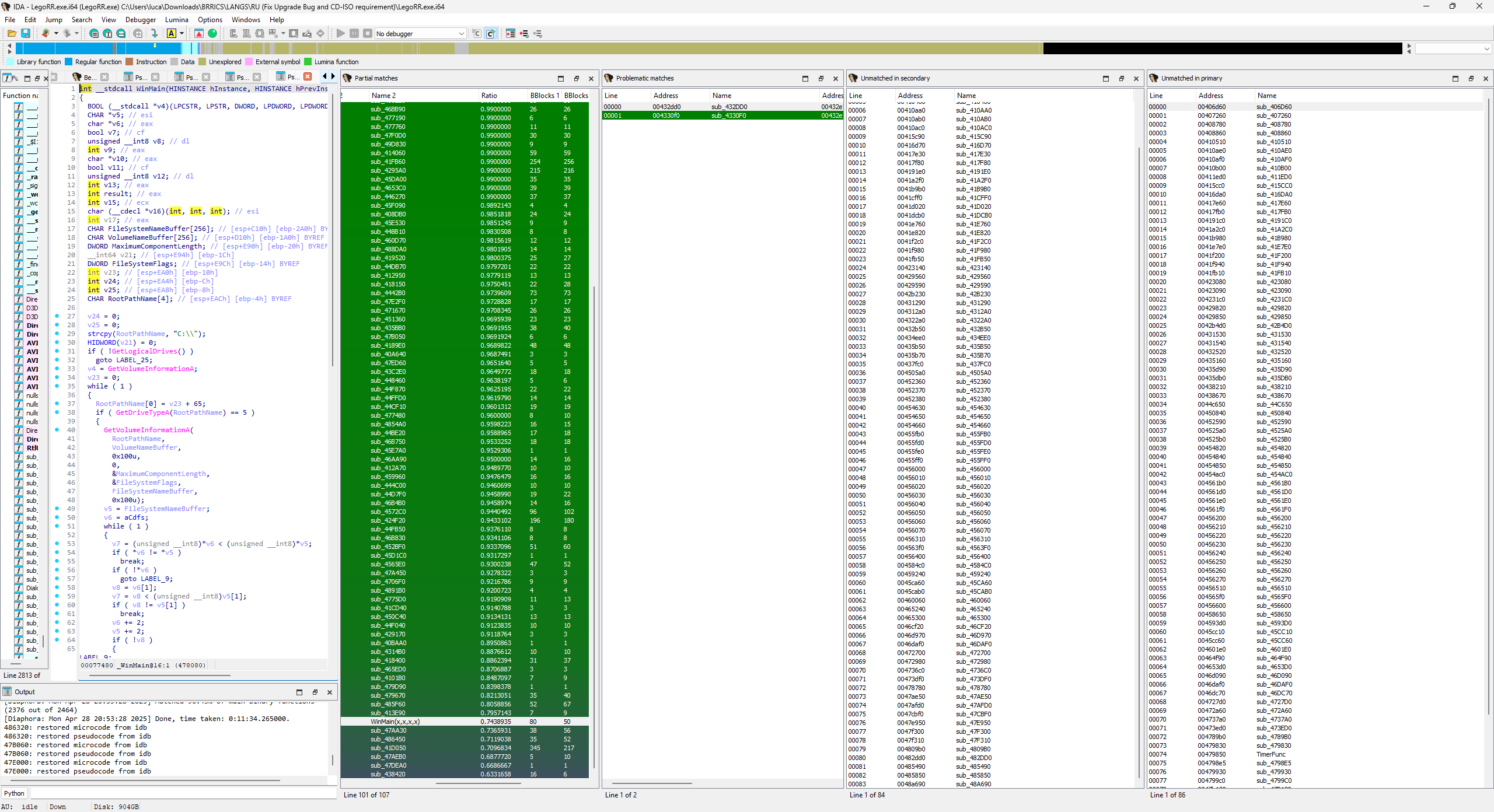
There was this one function that had a very low match ratio (literally the lowest) and looked very strange; however, at first glance in the decompilation it didn’t look related to an “upgrade base bug” so I figured it’s nothing worth investigating. Oh, how I was wrong…
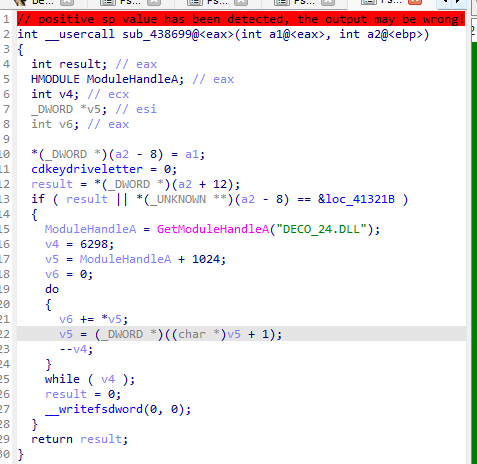
But, we did learn something important: These 2 versions are very similar to each other, so it may be possible to find something in one version and then trace it back to the other with a patternscan? We can’t use the Russian one, since we know that this one is bugged, so I opted for debugging the Japanese and German (mostly out of curiosity) versions instead.
Cheat Engine for the Win
So with that first approach not yielding anything, I dusted off Cheat Engine with the gameplan to scan for the rock value. Once we have the address of the rock counter in memory, we can then intercept all writes (subtractions in this case) to it. Once we find this code, we can just look for the same code in the Russian version. These are the steps I followed:
- Open Cheat Engine and attach it to the German version
- Start the 5th tutorial mission (3rd menu option, then character holding TNT)
- While the character collects rocks, scan for the rock counter (3, then 4, then 5, then 6)
- With the rock counter address, we “Find out what writes to this address” (see right click context menu in Cheat Engine)
- Upgrade the base, which should now subtract 5 rocks from the rock counter -> causes a write
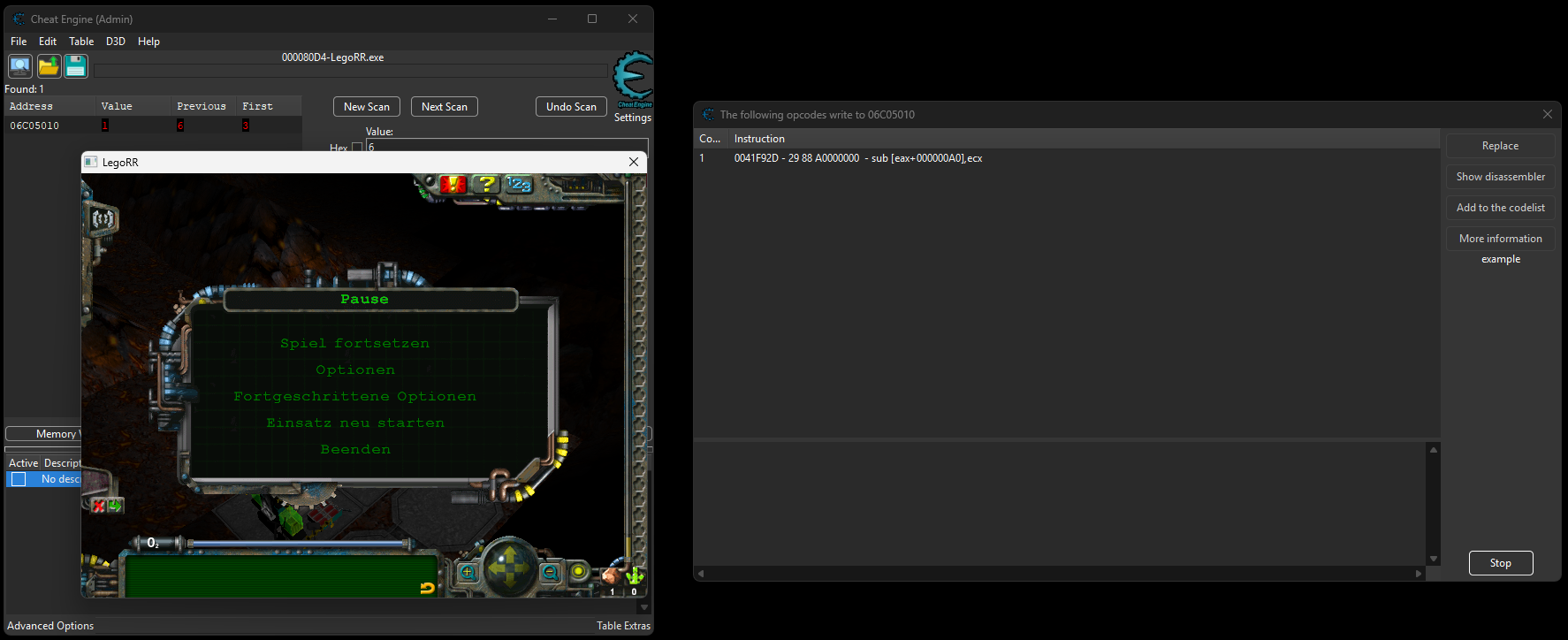
I also traced general accesses to the address and was able to find all of these:
# reads
00423B8C - 8B 81 A0000000 - mov eax,[ecx+000000A0]
004561E5 - 8B 80 A0000000 - mov eax,[eax+000000A0]
# writes
0041F989 - FF 80 A0000000 - inc [eax+000000A0] # rock collected
0041F92D - 29 88 A0000000 - sub [eax+000000A0],ecx # after 5 rocks are subtracted when performing the upgradeLet’s see what’s happening at 0041F92D:
int __cdecl removerocks(int a1, int a2)
{
if ( dword_5570D4 )
{
if ( a1 )
*((_DWORD *)dword_5570D4 + 43) -= a2;
else
*((_DWORD *)dword_5570D4 + 40) -= a2;
}
if ( a1 )
return sub_45C840(0, 5);
else
return sub_45C840(0, a2);
}Seems simple enough to just search for the same code in the Russian version, right? My preferred method is to actually export the to-be-searched game version as C decompilation and then search a string like -= a2 (something that’s simple enough to be universal). That yielded the following code:
void __cdecl sub_41F9B0(int a1, int a2)
{
if ( dword_558554 )
{
if ( a1 )
*((_DWORD *)dword_558554 + 43) -= a2;
else
*((_DWORD *)dword_558554 + 40) -= a2;
}
if ( a1 )
sub_45C580(0, 5);
else
sub_45C580(0, a2);
}Literally the same, awesome! Now from here I examined all xrefs (cross references) of the function and noticed that one of them is that weird location we saw with Diaphora earlier, the one with the GetModuleHandleA("DECO_24.DLL"). Set a breakpoint, play the TNT tutorial again, and voilà, we got a hit!
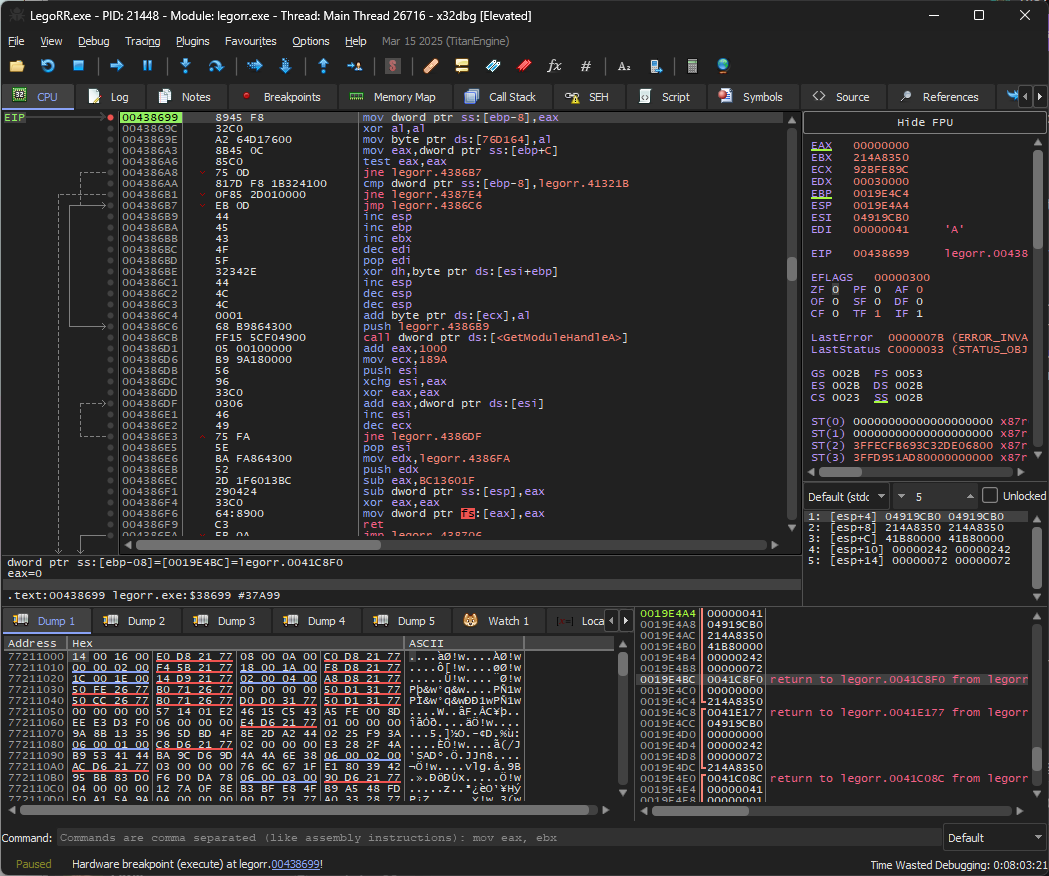
But what’s happening here? The decompilation doesn’t reveal a call to the subtraction function, so how come we have an xref? The decompilation reads:
int __usercall sub_438699@<eax>(int a1@<eax>, int a2@<ebp>)
{
int result; // eax
HMODULE ModuleHandleA; // eax
int v4; // ecx
_DWORD *v5; // esi
int v6; // eax
*(_DWORD *)(a2 - 8) = a1;
cdkeydriveletter = 0;
result = *(_DWORD *)(a2 + 12);
if ( result || *(_UNKNOWN **)(a2 - 8) == &loc_41321B )
{
ModuleHandleA = GetModuleHandleA("DECO_24.DLL");
v4 = 6298;
v5 = ModuleHandleA + 1024;
v6 = 0;
do
{
v6 += *v5;
v5 = (_DWORD *)((char *)v5 + 1);
--v4;
}
while ( v4 );
result = 0;
__writefsdword(0, 0);
}
return result;
}Let’s have a look at the disassembly, in particular the basic block right before the ret:
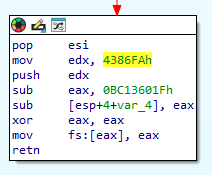
Notice the following sequence:
mov edx, 4386FAh
push edx
; ...
retnAs we know, a ret pops from the stack and jumps to that location. IDA isn’t able to deduce this and ends up not displaying the rest of the code. I didn’t do this personally, but you could technically patch out these sequences with NOP slides which would restore the decompilation like so:
.text:004386E5 | pop esi
.text:004386E6 | nop
.text:004386E7 | nop
.text:004386E8 | nop
.text:004386E9 | nop
.text:004386EA | nop
.text:004386EB | push edx
.text:004386EC | sub eax, 0BC13601Fh
.text:004386F1 | sub [esp+4+var_4], eax
.text:004386F4 | xor eax, eax
.text:004386F6 | nop
.text:004386F7 | nop
.text:004386F8 | nop
.text:004386F9 | nop
.text:004386FA | jmp short loc_438706// positive sp value has been detected, the output may be wrong!
int __usercall sub_438699@<eax>(int a1@<eax>, int a2@<ebp>)
{
double v2; // st7
int result; // eax
HMODULE ModuleHandleA; // eax
int v5; // ecx
_DWORD *v6; // esi
int v7; // eax
int v8; // ecx
char (__cdecl *v9)(int, int, int); // esi
int v10; // eax
int *v11; // esi
int v12; // eax
int v13; // ecx
_DWORD *v14; // eax
int v15; // edx
_DWORD *v16; // eax
*(_DWORD *)(a2 - 8) = a1;
cdkeydriveletter = 0;
result = *(_DWORD *)(a2 + 12);
if ( result || *(_UNKNOWN **)(a2 - 8) == &loc_41321B )
{
ModuleHandleA = GetModuleHandleA("DECO_24.DLL");
v5 = 6298;
v6 = ModuleHandleA + 1024;
v7 = 0;
do
{
v7 += *v6;
v6 = (_DWORD *)((char *)v6 + 1);
--v5;
}
while ( v5 );
v8 = byte_4386FD - (char *)sub_401000;
v9 = sub_401000;
v10 = 0;
do
{
v10 += *(_DWORD *)v9;
v9 = (char (__cdecl *)(int, int, int))((char *)v9 + 1);
--v8;
}
while ( v8 );
result = 0;
v11 = *(int **)(a2 + 8);
if ( *v11 == 4 )
{
result = sub_4385F0(v11, (_DWORD *)(a2 - 4));
if ( result )
{
v12 = *(_DWORD *)(a2 - 4);
v13 = v12;
if ( !v12 )
v13 = dword_559418;
sub_41F9B0(v12 != 0, v13); // THIS IS THE CALL TO THE SUBTRACT
v14 = (_DWORD *)v11[6];
v15 = v11[204] + 1;
v11[246] = 0;
sub_4088D0(v2, v14, v15);
sub_469D20(v11, v11[204] + 1);
v16 = sub_44A140(v11);
sub_4755E0(v16, 0, a2 - 20);
sub_40CCB0(9, a2 - 20, 0);
return sub_418800(*v11, v11[1], v11[204], 0);
}
}
}
return result;
}Fun fact: At the time, I actually wasn’t sure if that was some sort of very basic obfuscation or just some super weird compiler quirk (early MSVC versions did some very strange things, so I wouldn’t be surprised).

By the way, this is your second chance to spot the integrity check on your own - sadly I was too tired at this point to notice myself. :’)
So what’s preventing the game from calling it? We have to notice the first condition:
if ( result || *(_UNKNOWN **)(a2 - 8) == &loc_41321B )
// which is just:
if ( result || *(_DWORD *)(a2 - 8) == 0x41321B )Whenever I see a condition like this, my first instinct is to just invert the condition and see what happens…

Fighting the DRM
… a crash is what happens. Almost instantly on startup.

Since I was patching the binary to invert the check and that exhibited the same behavior as the software breakpoints, I was fairly confident I was dealing with some sort of integrity check. Luckily, it’s not that difficult to figure out what actually checks it. x64dbg supports memory breakpoints, which is exactly what I did. I set a memory read breakpoint on 0x004386A8 (the address I patched) and let the game run again.
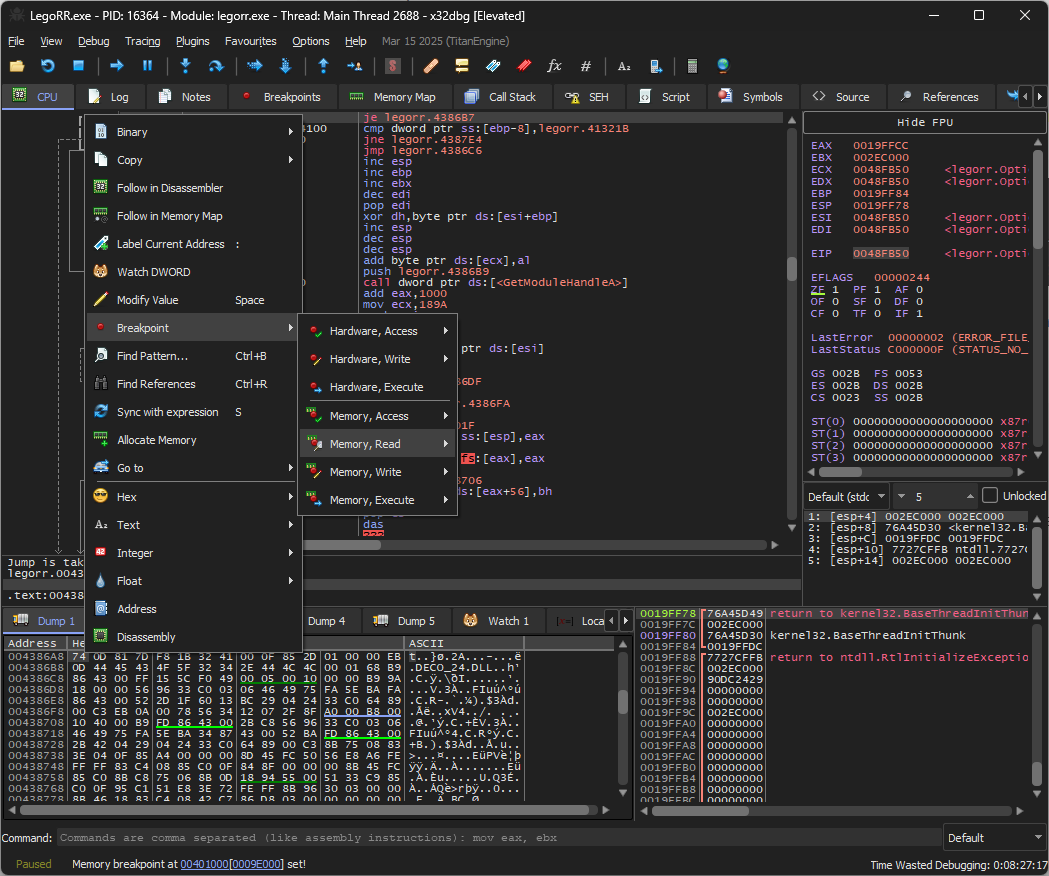
It takes a while, but eventually the debugger will break at the following location:
004781FB | 33C0 | xor eax,eax
004781FD | 0306 | add eax,dword ptr ds:[esi] ; breakpoint triggered here, add DWORD at esi to checksum (eax)
004781FF | 46 | inc esi ; increment address
00478200 | 49 | dec ecx
00478201 | 75 FA | jne legorr.4781FD ; loop back to 004781FD
00478203 | 5E | pop esi
00478204 | BA 1B824700 | mov edx,legorr.47821B
00478209 | 52 | push edx
0047820A | BA E4814700 | mov edx,legorr.4781E4
0047820F | 2B42 04 | sub eax,dword ptr ds:[edx+4] ; checksum -= known_value
00478212 | 290424 | sub dword ptr ss:[esp],eax ; [esp] -= checksum
00478215 | 33C0 | xor eax,eax
00478217 | 64:8900 | mov dword ptr fs:[eax],eax
0047821A | C3 | ret Reading the disassembly (I omitted a few things) reveals a loop that increments from address A to B and adds the 32bit value located at said address to a counter. This counter is then subtracted by a known value, and the result is then used to subtract the value that ESP points at. ESP “just so happens” to point to the next function executed. Therefore, if the checksum (the counter, or EAX) does not match the predetermined value, the subtraction will be non-zero, which in turn means the first 4 bytes of the next function are subtracted by the leftover amount. Short pseudocode:
for (int i = 0; i < SIZE; i++) {
checksum += *(DWORD*)(BASE_ADDR + i);
}
checksum -= KNOWN_VALUE;
[ESP] -= checksum;
// [ESP] -> points to next function call, will break if checksum isn't 0That… looks familiar, doesn’t it? That’s because we’ve seen this 3 times already. Taken from the last decompilation:
v8 = byte_4386FD - (char *)sub_401000;
v9 = sub_401000;
v10 = 0;
do
{
v10 += *(_DWORD *)v9;
v9 = (char (__cdecl *)(int, int, int))((char *)v9 + 1);
--v8;
}The modification of the next function was never directly apparent in the decompilation which is why it was so easy to miss, even though we’ve been staring at the integrity check this whole time. I naively copied the byte sequence at the end which is 2B 42 04 29 04 24 33 C0 64 89 00 and added a function that replaces the sub dword ptr ss:[esp],eax (the part that performs the modification) with 3 NOPs.
VOID NopChecksumCheck(BYTE* pAddress, size_t size)
{
DWORD oldProtect;
VirtualProtect(pAddress, size, PAGE_EXECUTE_READWRITE, &oldProtect);
for (size_t i = 0; i < size; ++i)
pAddress[i] = 0x90; // NOP
VirtualProtect(pAddress, size, oldProtect, &oldProtect);
}
NopChecksumCheck(reinterpret_cast<BYTE*>(0x00478212), 3); // WinMain
std::cout << "Patched checksum check (WinMain)" << std::endl;
NopChecksumCheck(reinterpret_cast<BYTE*>(0x00479916), 3); // TimerFunc
std::cout << "Patched checksum check (TimerFunc)" << std::endl;
NopChecksumCheck(reinterpret_cast<BYTE*>(0x0043872B), 3); // Right before upgrading the base
std::cout << "Patched checksum check (Base Upgrade)" << std::endl;There were a total of 3 locations I was able to identify with the given signature/pattern:
- Within the WinMain function
- Within a timer function that gets called periodically
- Just before the base gets upgraded / the rocks subtracted
I built a new version of the DLL and passed it along for testing as I seemed to be able to at least pass the TNT tutorial now. So at this point, the base upgrade actually works! Wow!
Exception Madness

So there are more bugs… But why? There’s one thing I haven’t told you about yet: cd.key. I thought perhaps I should invest some time into checking what this is about. I ignored it up until now as the game just worked fine, even without that file. The CD contains a file in Data\cd.key that is sort of like a CD license key… but not really, the contents are ignored entirely and it ships with 0xDEAD. Cross-referencing the string revealed 2 locations, one of which seemed interesting as it loops through possible drive letters until it finds the cd.key file and then caches the drive letter where the file had been identified:
int sub_4800F0()
{
CHAR driveletter; // bl
FILE *handle; // eax
unsigned __int8 driveletter_1; // [esp+8h] [ebp-10Ch]
CHAR RootPathName[4]; // [esp+Ch] [ebp-108h] BYREF
char Buffer[260]; // [esp+10h] [ebp-104h] BYREF
driveletter = 'C';
strcpy(RootPathName, "A:\\");
driveletter_1 = 'C';
while ( 1 )
{
RootPathName[0] = driveletter;
if ( GetDriveTypeA(RootPathName) == DRIVE_CDROM )
{
sprintf(Buffer, "%c:\\%s\\%s", driveletter_1, Path, aCdKey);
handle = fopen(Buffer, Mode);
if ( handle )
break;
}
driveletter_1 = ++driveletter;
if ( (unsigned __int8)driveletter > 'Z' )
return 0;
}
fclose(handle);
LOBYTE(cddrive_letter) = driveletter;
return 1;
}Since I’m returning DRIVE_CDROM for the drive C:\ due to my GetDriveTypeA hook, this function would set cddrive_letter to C. That means the supposed path would be C:\Data\cd.key; however, adding the file here didn’t seem to change anything. Why not?
Checking xrefs to cddrive_letter showed one particular location which is extra suspicious given that during debugging the game keeps causing a software breakpoint exception at least once a second.
__int64 __usercall sub_4799C0@<edx:eax>(int a1@<ebx>, int a2@<edi>, int a3@<esi>)
{
__int64 result; // rax
int v4; // ecx
_DWORD v5[5]; // [esp-14h] [ebp-2Ch] BYREF
CPPEH_RECORD ms_exc; // [esp+0h] [ebp-18h]
ms_exc.registration.ExceptionHandler = (PVOID)-1;
ms_exc.registration.Next = (struct _EH3_EXCEPTION_REGISTRATION *)&stru_49FBA0;
ms_exc.exc_ptr = (EXCEPTION_POINTERS *)_except_handler3;
v5[2] = a1;
v5[1] = a3;
v5[0] = a2;
ms_exc.old_esp = (DWORD)v5;
ms_exc.registration.TryLevel = 0;
result = causeint3((unsigned __int8)a1 + 86);
*(_DWORD *)result += v4;
return result;
}Nothing here, right? Well, we learned our lesson. Let’s dive into the disassembly:
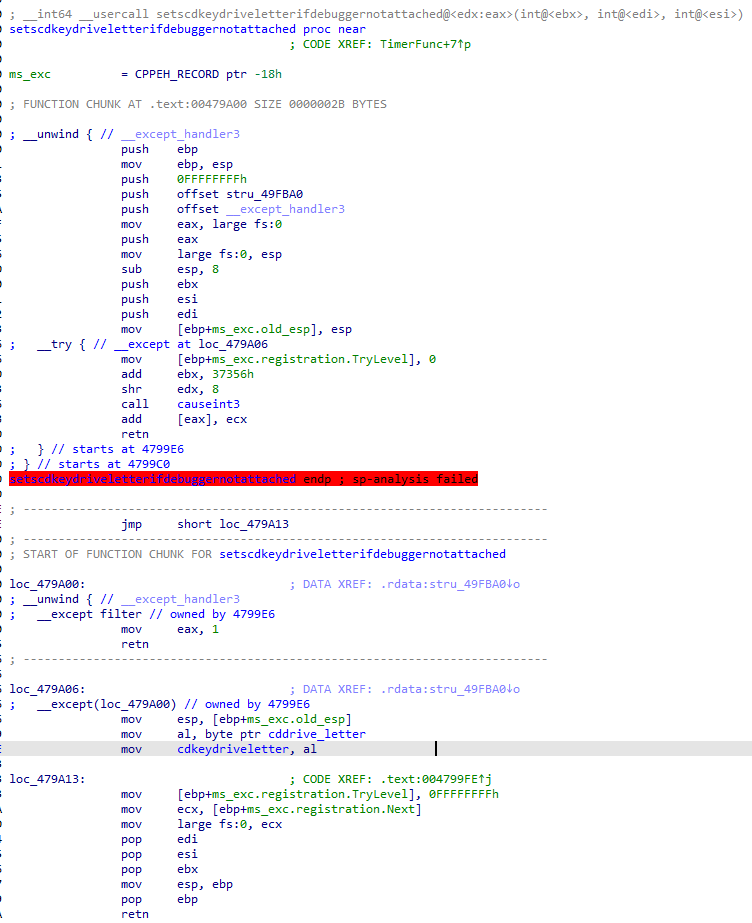
You’re looking at a function that sets up a Structured Exception Handler (SEH) (in fact, you’re looking at pre-SEH3/legacy SEH used back in older MSVC versions). In C this would roughly translate to:
__try {
causeint3(); // this is basically a int3 (__debugbreak() intrinsic)
} __except {
cdkeydriveletter = cddrive_letter;
}Since software interrupts (int3) are treated as an exception, the __except block will be triggered. This is likely included as an anti-debug measure as debuggers may catch these exceptions and not pass them on. In case the exception isn’t passed on, the game would never set cdkeydriveletter, which is later used. Where is this function called? In multiple locations actually, but this one answers why the exception is caused all the time:
void __usercall TimerFunc(int a1@<ebx>, int a2@<edi>, int a3@<esi>, CHAR a4, __int16 a5)
{
HMODULE ModuleHandleA; // eax
int v6; // ecx
_DWORD *v7; // esi
int v8; // eax
setscdkeydriveletterifdebuggernotattached(a1, a2, a3);
if ( ++dword_5081E4 == 600 )
{
ProgressiveDecompress_24(a4, a5);
}
else
{
ModuleHandleA = GetModuleHandleA("DECO_24.DLL");
v6 = 6298;
v7 = ModuleHandleA + 1024;
v8 = 0;
do
{
v8 += *v7;
v7 = (_DWORD *)((char *)v7 + 1);
--v6;
}
while ( v6 );
__writefsdword(0, 0);
}
}
// in WinMain:
debugthing = sub_479930(0, (int)v4, (int)v5);
if ( !debugthing )
dword_5081E0 = SetTimer(0, 0, 1000u, (TIMERPROC)TimerFunc);The SetTimer call basically sets up a timer that periodically (1000ms = 1 second) executes a function. Anyways, we’re looking for any xref that uses this global in any meaningful way.
Fail #2
Can you see that debugthing? Amazing name, I know. My ADHD brain took over as I wanted to know where it’s used, mostly out of curiosity, and was able to trace it up until the very same function that handles the upgrade base / subtract rocks logic:
.text:004386A3 | mov eax, [ebp+0Ch] ; debugthing ends up here
.text:004386A6 | test eax, eax
.text:004386A8 | jnz short loc_4386B7For some reason, it’s always 0 (the return value of the SEH function) and at this point I was already severely sleep deprived, so I didn’t want to bother with understanding what was going on there. Instead, I thought: “What if we can just patch that memory, at a specific point in time (after the value would have been set by the program itself), without patching anything in the binary?”. In theory, this would allow us to bypass any integrity check as we would not rely on any code patches. I quickly implemented this idea using a Vectored Exception Handler (VEH). My idea was that, since the game keeps causing software breakpoints anyways, I can just install a handler that gets triggered whenever the game causes the int3 exception and then writes to debugthing after it has been triggered a few times:
// We don't need this since we now hook DECO_24.DLL
LONG CALLBACK VectoredHandler(EXCEPTION_POINTERS* ExceptionInfo)
{
static int hitCounter = 0;
// This exception address occurs anyways, let's just reuse it
if (ExceptionInfo->ExceptionRecord->ExceptionAddress == (PVOID)0x0047983A && hitCounter > 5 && hitCounter != 0xFF)
{
// Write "LAYL" to the flag, anything non-zero works
BYTE* pLol = reinterpret_cast<BYTE*>(0x0076D160);
pLol[0] = 'L';
pLol[1] = 'A';
pLol[2] = 'Y';
pLol[3] = 'L';
hitCounter = 0xFF; // Oracle to not trigger this again
std::cout << "Patched upgrade base flag" << std::endl;
}
else if (ExceptionInfo->ExceptionRecord->ExceptionAddress == (PVOID)0x0047983A && hitCounter != 0xFF)
{
std::cout << "Hit exception " << std::hex << ExceptionInfo->ExceptionRecord->ExceptionAddress << " [" << hitCounter << "]. Waiting..." << std::endl;
hitCounter++;
}
// There should be another handler available
return EXCEPTION_CONTINUE_SEARCH;
}
AddVectoredExceptionHandler(1, VectoredHandler);With the CD key placed in C:\Data\cd.key, no debugger attached, and the VEH installed to overwrite debugthing/0x0076D160, the game stopped crashing when we tried to upgrade the characters (I technically also removed all of the patches for the checksum checks)!
However, the story doesn’t end here. I passed the crack on again for some testing and…

Circling Back
I took a step back and had a proper look at sub_438699:
int __usercall sub_438699@<eax>(int a1@<eax>, int a2@<ebp>)
{
// ... locals omitted ...
*(_DWORD *)(a2 - 8) = a1;
cdkeydriveletter = 0;
result = *(_DWORD *)(a2 + 12);
if ( result || *(_DWORD *)(a2 - 8) == 0x41321B )
{
ModuleHandleA = GetModuleHandleA("DECO_24.DLL");
v5 = 6298;
// ... omitted ...It has a reference to cdkeydriveletter, which we’ve seen before, but it sets it to 0. What’s going on here? Definitely suspicious, so let’s dive into the disassembly again:
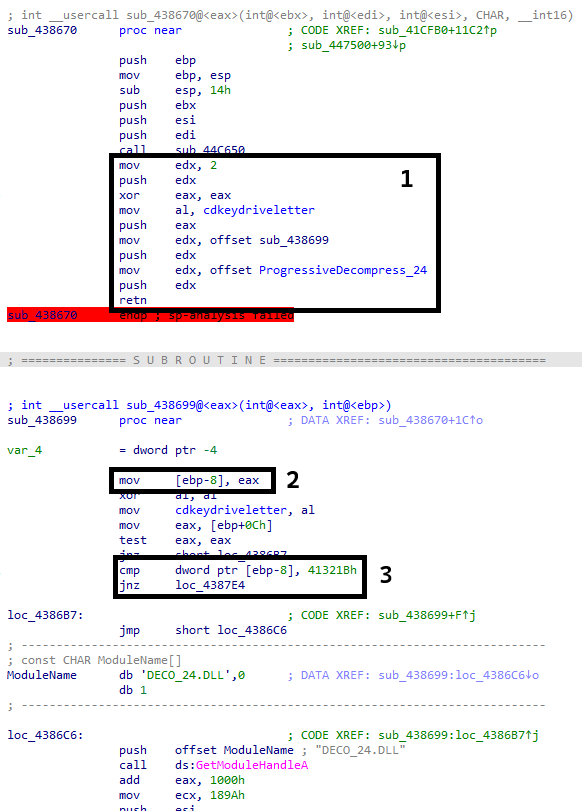
We’re currently located in the bottom half of the screenshot, notice however, how sub_438699 is referenced in the upper half? We’ve encountered this before, where the next function would be pushed to the stack to jump to it once it hits the ret. This example is a bit different though, we now have a chain of push instructions as seen in box 1. The call chain can be defined as:
ProgressiveDecompress_24- we’ll talk about this latersub_438699- the function (or continuation of the upper half) that contains that weirdifcheck
Let’s talk about the other 2 boxes:
- Box 2: The return value (in
EAX) ofProgressiveDecompress_24is stored in[ebp-8] - Box 3: The stored value is compared to
0x41321B
So whatever ProgressiveDecompress_24 returns is compared to 0x41321B. But… what is ProgressiveDecompress_24? Given the call chain mentioned earlier and considering the stdcall calling convention, we can abstract the callchain to something like this, so we definitely have to figure out what ProgressiveDecompress_24 is:
// mov edx, 2
// push edx
// xor eax, eax
// mov al, cdkeydriveletter
// push eax
DWORD value = ProgressiveDecompress_24(cdkeydriveletter, 2);
// return to sub_438699
if (value == 0x41321B) {
// upgrade base, etc.
}ProgressiveDecompress_24 is located inside of DECO_24.DLL, a DLL that can only be found in Russian versions of Lego games. At this point it started to dawn on me… All the bugs we have encountered, the crashes and the gated functionality (upgrade base for example) are all DRM checks and not “just bugs/quirks”. It reminded me a bit of that one Spyro game that would just delete your savegame towards the end(?) of the game if a pirated copy had been detected. Are they just using “normal” sounding names to obscure what they’re doing, kind of like what the Windows kernel does with PatchGuard? Let’s look at the function in IDA:
DWORD __stdcall ProgressiveDecompress_24(CHAR driveletter, __int16 idk)
{
signed int Version; // eax
__int16 v3; // cx
Version = GetVersion();
LOBYTE(v3) = driveletter;
if ( Version >= 0 )
return docdcheck(driveletter, idk);
else
return sub_10001353(v3, idk);
}
DWORD __cdecl docdcheck(CHAR driveletter, unsigned __int16 idk)
{
__int16 v2; // si
char nullbyte; // cl
HANDLE FileA; // edi
DWORD v5; // edx
__int16 v6; // ax
DWORD BytesReturned; // [esp+8h] [ebp-330h] BYREF
CHAR FileName[8]; // [esp+Ch] [ebp-32Ch] BYREF
CDROM_TOC OutBuffer; // [esp+14h] [ebp-324h] BYREF
// f_drive = \\.\F:
v2 = *(_WORD *)&f_drive[4];
nullbyte = f_drive[6];
*(_DWORD *)FileName = *(_DWORD *)f_drive;
FileName[5] = HIBYTE(v2);
FileName[6] = nullbyte;
FileName[4] = driveletter;
// FileName = \\.\C: in our case
FileA = CreateFileA(FileName, 0x80000000, 3u, 0, 3u, 0x80u, 0);
BytesReturned = 0;
if ( FileA != (HANDLE)-1 )
{
// Grab table of contents from CD
DeviceIoControl(FileA, IOCTL_CDROM_READ_TOC, 0, 0, &OutBuffer, 0x324u, &BytesReturned, 0);
BytesReturned = 0;
if ( OutBuffer.LastTrack >= (unsigned int)idk )
{
BytesReturned = *(_DWORD *)&OutBuffer.Length[8 * idk]; // Access something inside of track data?
v5 = HIWORD(BytesReturned);
BYTE1(v5) = BytesReturned;
LOBYTE(v6) = HIBYTE(BytesReturned);
HIBYTE(v6) = BYTE2(BytesReturned);
LOBYTE(v5) = BYTE1(BytesReturned);
v5 <<= 16;
LOWORD(v5) = v6;
BytesReturned = v5;
}
CloseHandle(FileA);
}
return BytesReturned;
}docdcheck is the interesting function here, and all it does is grab a handle to the CD drive (remember driveletter comes from cdkeydriveletter, refer to the callchain earlier. In our case it “happens” to be C:\ since that’s where it found the cd.key file), and send a IOCTL_CDROM_READ_TOC IOCTL request to the disk driver. As per MSDN, IOCTL_CDROM_READ_TOC gets the table of contents for the given CD. The second argument idk is then used to offset into the CDROM_TOC structure which is used to read track/session data. The extracted value is then manipulated (to be specifically, the endianness is being swapped) and returned.
Could this function be responsible for my crashes? Since we’re already using MinHook to hook Windows APIs, we might as well just give it a shot with the ProgressiveDecompress_24 function since we know what we’re expected to return (0x41321B, refer to the start of this chapter).
using ProgressiveDecompress_t = DWORD(__stdcall*)(CHAR driveletter, __int16 value);
ProgressiveDecompress_t* g_OriginalProgressiveDecompress = nullptr;
DWORD __stdcall ProgressiveDecompress_hk(CHAR driveletter, __int16 value)
{
DWORD result = 0;
switch (value)
{
case 2:
result = 0x0041321B; // This is the one we observed this chapter
break;
default:
result = (DWORD)"LAYL";
break;
}
std::cout << "ProgressiveDecompress(\'" << driveletter << "\', " << value << ") -> " << std::hex << result << std::endl;
return result;
}
if (MH_CreateHookApi(
L"DECO_24.dll",
"ProgressiveDecompress_24",
ProgressiveDecompress_hk,
reinterpret_cast<LPVOID*>(&g_OriginalProgressiveDecompress)
) != MH_OK)
std::cout << "Failed to create hook for ProgressiveDecompress" << std::endl;With the debugger attached, the VEH meme removed, and the checksum patches reapplied… we crash again, fast :‘)
Fighting the DRM - Part 2
I used the same approach as earlier to create memory read breakpoints in the debugger, but placed it on ProgressiveDecompress_24 this time. That immediately revealed more integrity/checksum checks:
004386DF | 0306 | add eax,dword ptr ds:[esi]
004798CA | 0306 | add eax,dword ptr ds:[esi]Let’s have a look at the last one:
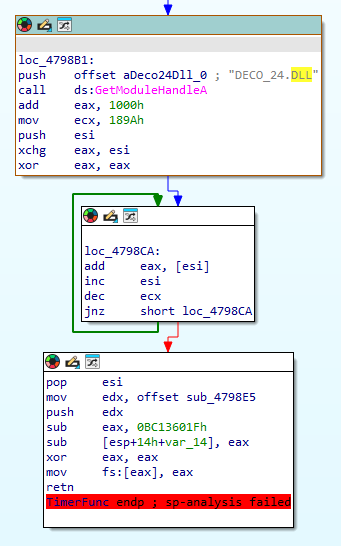
It’s the exact same logic as the one mentioned before, except this time it iterates over the module DECO_24.DLL and not LegoRR.exe. So why did our pattern not catch it? Since it’s a different module, the known key which is subtracted from the checksum must be different. The pattern I extracted initially was the last part of this sequence, the one holding the key. Instead, I grabbed the loop’s byte sequence (03 06 46 49 75 FA) and scanned for that instead, which revealed the aforementioned 2 new locations (along with the previous, already known 3 locations). I appended the following code to the existing patches:
NopChecksumCheck(reinterpret_cast<BYTE*>(0x004386F1), 3); // DECO_24.dll Checksum 1
std::cout << "Patched checksum check (DECO_24.DLL Checksum 1)" << std::endl;
NopChecksumCheck(reinterpret_cast<BYTE*>(0x004798DC), 3); // DECO_24.dll Checksum 2
std::cout << "Patched checksum check (DECO_24.DLL Checksum 2)" << std::endl;No crashes on startup, which means we successfully bypassed the integrity checks for DECO_24.DLL as well! An added bonus at this point is that the game doesn’t require the cd.key anymore. ProgressiveDecompress_24 was the only location where the drive letter actually mattered, and since we’re not relying on it at all in our hook, it won’t matter whether the cdkeydriveletter was set or not.
Finishing Move
So far we have 3 things:
- 2 hooks for
GetDriveTypeAandGetVolumeInformationAhooks to bypass the initial CD checks - 1 hook for
ProgressiveDecompress_24to prevent CD access failure and return the required values for normal execution - 5 patches to render the checksum checks useless (3 for
LegorRR.exe, 2 forDECO_24.DLL)
This time I ran the tests myself as you can unlock all levels using the argument -testlevels, and the last known crash (not the integrity one, the gameplay one that would trigger randomly after a while) would just involve idling around for a few minutes. I crashed again, but in my console window I was greeted with a new log line:
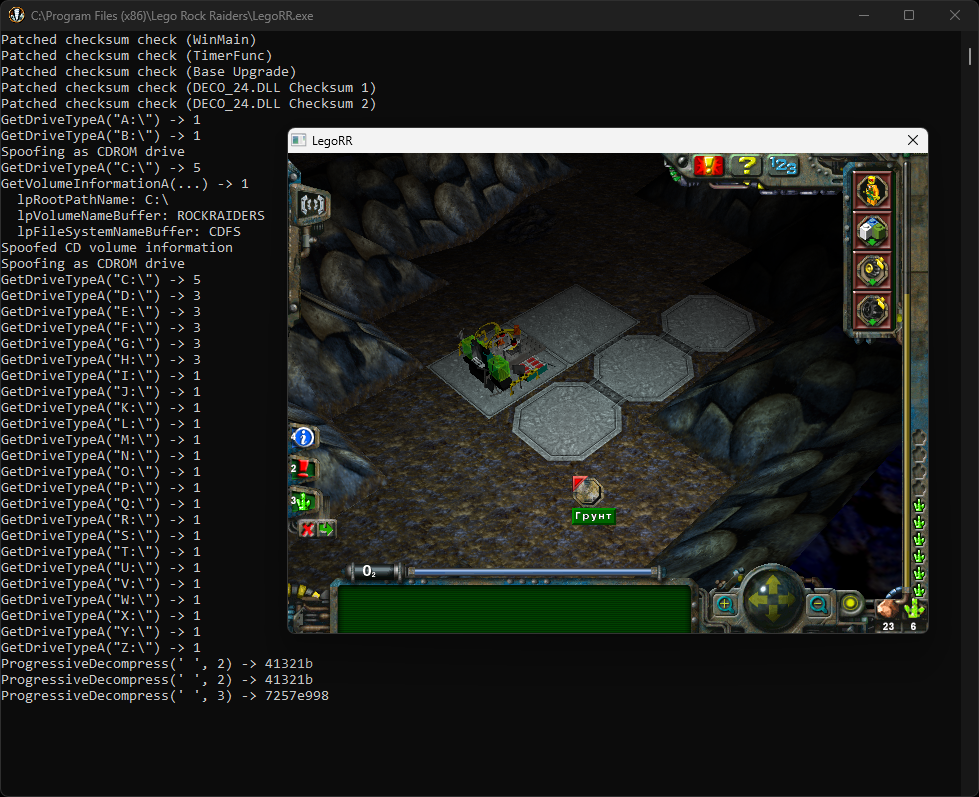
The line ProgressiveDecompress(' ', 3) -> 7257e998 is very interesting (side note, notice the ’ ’, that’s because we removed the cd.key, yet it still works) as it shows that the 2nd argument can be 3 as well. 7257e998 is basically my default case in the code that sets result = (DWORD)"LAYL";. Since we’re covering only case 2, a bogus value is returned. Xrefing ProgressiveDecompress_24 shows a caller that pushes 3 to the stack as argument and requires the function to return 0x0043002F.
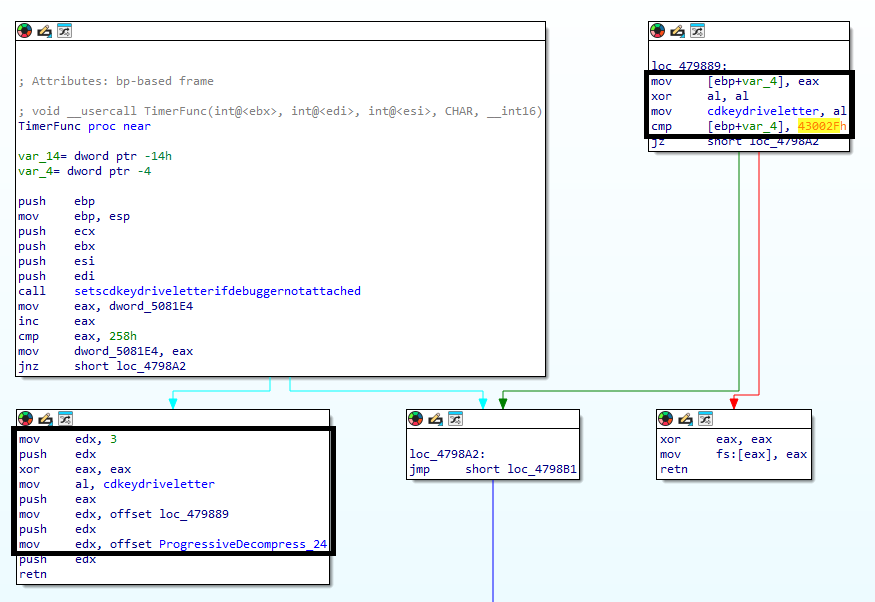
At this point I updated the hook like this and ran a test again!
DWORD __stdcall ProgressiveDecompress_hk(CHAR driveletter, __int16 value)
{
// value == 2 => 004386AA | 817D F8 1B324100 | cmp dword ptr ss:[ebp-8],legorr.41321B
// value == 3 => .text:00479893 cmp [ebp+var_4], 43002Fh
DWORD result = 0;
switch (value)
{
case 2:
result = 0x0041321B;
break;
case 3:
result = 0x0043002F;
break;
default:
result = (DWORD)"LAYL"; // Should never happen, at least not for LRR
break;
}
std::cout << "ProgressiveDecompress(\'" << driveletter << "\', " << value << ") -> " << std::hex << result << std::endl;
return result;
}I let the game run, played for about 30 minutes (it would usually crash within the first 10 minutes), and my friend even completed a level (which took more than an hour) and none of us had crashes! At this point, we’re very confident that I managed to identify and tackle all DRM checks and restore the game to its original functionality - even without a CD mounted.
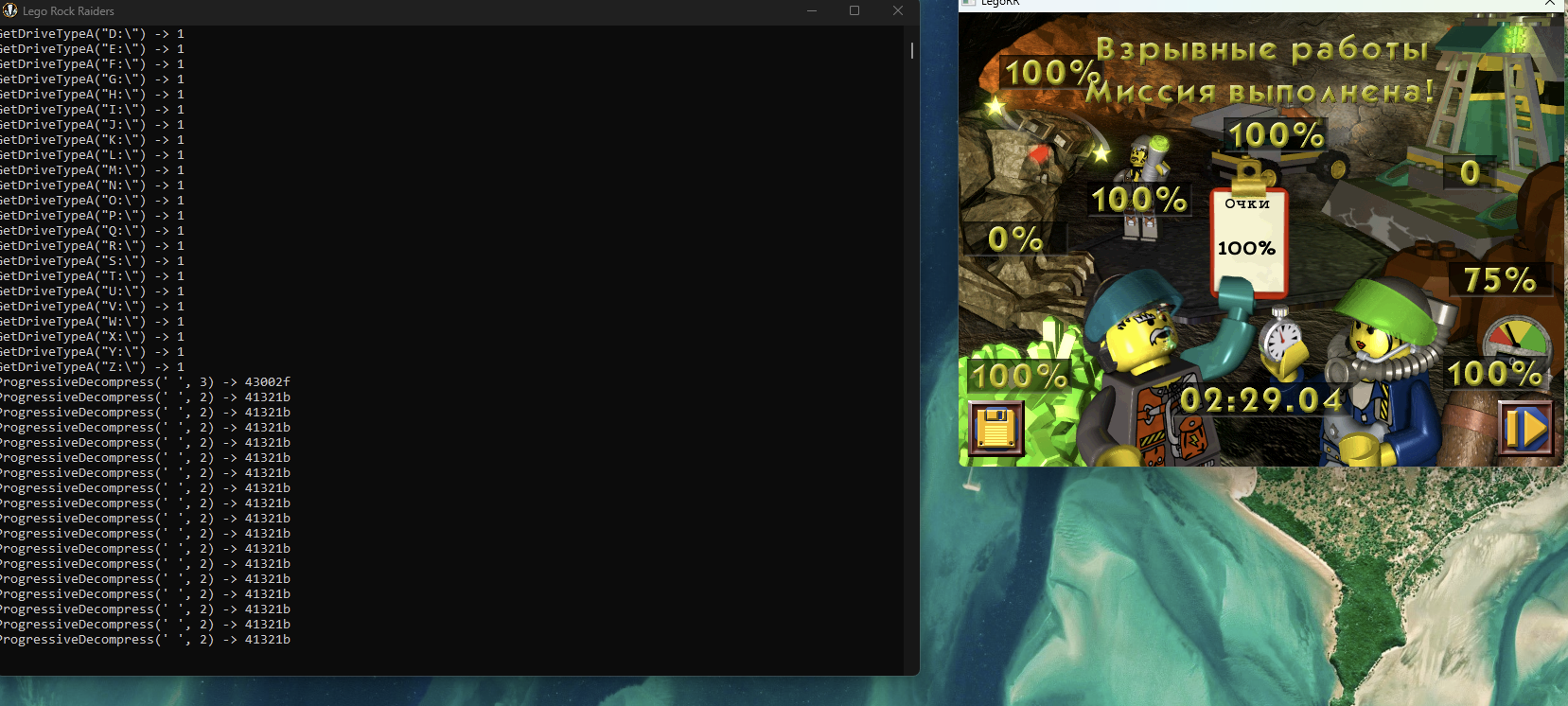
You can find all of the code (incl. the original attempts in either the comments or commit history, IDA and Diaphora databases) on my GitHub. The release section also contains the latest DLLs that can simply be dropped into the installation folder. These patches will ship with the official installers distributed over at The Research Realm website.
The End
This marks a huge milestone as a public No-CD crack was not available for this translation of the game, and neither does any documentation on how the DRM works. To this day, only people with legitimate copies of the game were able to run the game, and these copies of the Russian version are extremely hard to come by.
During the research, we noticed that some other Russian versions have the same DLLs. It’s currently unknown to us whether there are actually more lost/unfixed games and media, and we’re currently trying to get our hands on them as well as finding volunteers for testing.
Huge thank you to The Research Realm for trying to preserve a very important part of history! It’s very sad to think that one day, these games might just be completely lost, and it’s therefore very important to back everything up as early as possible and make compatibility patches. The Research Realm is currently led by the main developer of Manic Miners (a modern remake of Lego Rock Raiders) Klavvy/baraklava - a current employee at The Lego Group. Lego endorses the project as long as there is no financial incentive (e.g. donations, etc).
I’d also like to personally thank Macley for answering any questions swiftly and testing the patches for me!